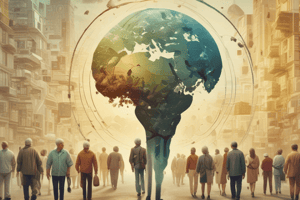Podcast
Questions and Answers
What does global population refer to?
What does global population refer to?
- The total number of people living in a specific region
- The population density of urban areas
- The total number of people living on Earth at a given time (correct)
- The growth rate of human populations in developing countries
Which of the following is NOT a key concept related to global population?
Which of the following is NOT a key concept related to global population?
- Fertility rates
- Age structure
- Migration patterns (correct)
- Urbanization
What are remittances primarily associated with?
What are remittances primarily associated with?
- Labor competition and housing market strain
- Poverty alleviation and stability in foreign exchanges (correct)
- Increased migration restrictions and border controls
- Economic instability and unemployment rates
Which type of mobility includes mandatory relocation due to conflict or natural disasters?
Which type of mobility includes mandatory relocation due to conflict or natural disasters?
What is a negative impact of mobility-demography on economies?
What is a negative impact of mobility-demography on economies?
Which factor is NOT considered a demographical factor in mobility-demography?
Which factor is NOT considered a demographical factor in mobility-demography?
What happens to global population growth rates in many regions as of 2023?
What happens to global population growth rates in many regions as of 2023?
Which aspect does NOT influence demographic patterns according to mobility-demography?
Which aspect does NOT influence demographic patterns according to mobility-demography?
How does a youthful population impact migration patterns?
How does a youthful population impact migration patterns?
What is the demographic transition model primarily concerned with?
What is the demographic transition model primarily concerned with?
What role do urban centers play in migration patterns?
What role do urban centers play in migration patterns?
In the context of Baguio City, what unique dynamic does the presence of students contribute to?
In the context of Baguio City, what unique dynamic does the presence of students contribute to?
What percentage of young adults in Baguio City have completed secondary education?
What percentage of young adults in Baguio City have completed secondary education?
Which theory explains the dynamics of migration based on opportunities and challenges?
Which theory explains the dynamics of migration based on opportunities and challenges?
What is one consequence of urban growth on migration?
What is one consequence of urban growth on migration?
What contributes to the culture of learning in Baguio City?
What contributes to the culture of learning in Baguio City?
Study Notes
Overview & Definitions
- Global population is the total number of people living on Earth at a given time.
- In 2023, the global population was estimated to be 8 billion.
- Mobility demography studies the movement of people across regions or countries, and how this movement impacts demographic patterns.
- Demography is the statistical study of human populations, especially in relation to size, density, distribution, and vital statistics.
- Vital statistics are data related to births, deaths, marriages, health, and disease.
- The global population continues to grow, although this growth rate is declining in many regions.
Key Concepts Related to Global Population
- Population growth is influenced by births, deaths, fertility rates, and stagnation or decline.
- Age structure considers the distribution of age groups within a population.
- Elderly, young, dependency ratio, and age composition are concepts within age structure.
- Urbanization refers to the shift from rural to urban areas, driven by development and expansion.
Key Concepts Related to Mobility-Demography
- Demographic factors influencing mobility include age, ethnicity, gender, marital status, educational attainment, employment, household income, living situation, language, family and dependents, media consumption, preference, and religion.
- Types of movement include voluntary movement, forced movement, and seasonal movement.
- Economic impact of mobility can be both positive and negative.
- Positive impacts include filling labor shortages, increasing economic diversity, driving economic growth, promoting innovation and development, increasing skills in the workforce, and transferring knowledge through migration.
- Negative impacts include labor competition, strain on public services, brain drain, increased housing market costs, economic instability, and the potential for job displacement.
- Remittances can contribute to poverty alleviation, stabilize foreign exchanges, and incentivize migration.
Connections Between Global Population and Mobility-Demography
- Population dynamics (growth and age structure) influence migration patterns.
- Urbanization and migration are interdependent. Urban growth often attracts migrants, creating a feedback loop where more migration spurs further urban development.
- Both urbanization and migration are influenced by the demographic transition model, which explains how countries shift from high to lower birth and death rates as they develop economically.
Key Theories Related to Population and Mobility
- Demographic Transition Theory: explains the stages of population change in a society.
- Push-Pull Theory: analyzes the factors that drive people away from their home (push factors) and attract them to a new location (pull factors).
- World Systems Theory: explores global power dynamics and how they impact population movement and development.
Baguio City Case Study
- Baguio City is a city in the Philippines that attracts students from across the country.
- Students make up over 25% of the city's population.
- Many students work part-time in the hospitality industry to support their studies.
- The city has a high rate of educational attainment, with over 70% of young adults having finished secondary education.
- Nearly 40% of young adults pursue higher education in Baguio City.
- The presence of universities creates a culture of learning and a highly educated workforce.
Studying That Suits You
Use AI to generate personalized quizzes and flashcards to suit your learning preferences.
Related Documents
Description
This quiz explores essential concepts in demography, focusing on global population statistics and trends as of 2023. It covers key aspects such as population growth, age structure, and mobility demography, providing insight into how these factors shape societies worldwide.




